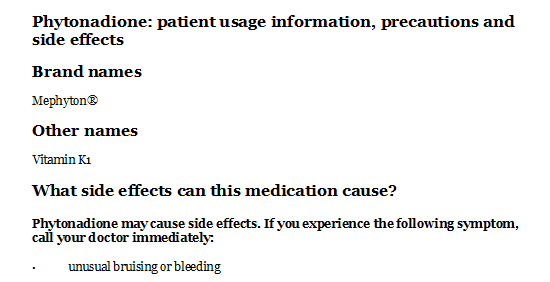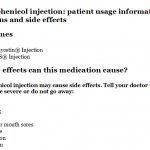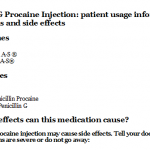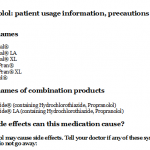
Phytonadione: patient usage information, precautions and side effects
Tuesday, May 30, 2017 by Gregory Van Dyke
http://www.naturalnewsreference.com/2017-05-30-phytonadione-patient-usage-information-precautions-and-side-effects.html

Phytonadione: patient usage information, precautions and side effects
Brand names
Mephyton®
Other names
Vitamin K1
What side effects can this medication cause?
Phytonadione may cause side effects. If you experience the following symptom, call your doctor immediately:
-
unusual bruising or bleeding
Why is this medication prescribed?
Phytonadione (vitamin K) is used to prevent bleeding in people with blood clotting problems or too little vitamin K in the body. Phytonadione is in a class of medications called vitamins. It works by providing vitamin K that is needed for blood to clot normally in the body.
How should this medicine be used?
Phytonadione comes as a tablet to take by mouth. It should be taken as directed by your doctor. Your doctor may sometimes prescribe another medication (bile salts) to take with phytonadione. Follow the directions on your prescription label carefully, and ask your doctor or pharmacist to explain any part you do not understand. Do not stop taking phytonadione without talking to your doctor. Take phytonadione exactly as directed. Do not take more or less of it or take it more often than prescribed by your doctor.
Other uses for this medicine
This medication is sometimes prescribed for other uses; ask your doctor or pharmacist for more information.
What special precautions should I follow?
Before taking phytonadione,
-
tell your doctor and pharmacist if you are allergic to phytonadione, any other medications, or any of the ingredients in phytonadione tablets. Ask your pharmacist for a list of the ingredients.
-
Do not take anticoagulants (‘blood thinners’) such as warfarin (Coumadin) while you are taking phytonadione unless told to do so by your doctor.
-
tell your doctor and pharmacist what prescription and nonprescription medications, vitamins, nutritional supplements, and herbal products you are taking or plan to take. Be sure to mention any of the following: antibiotics; salicylate pain relievers such as aspirin or aspirin-containing products, choline magnesium trisalicylate, choline salicylate (Arthropan), diflunisal (Dolobid), magnesium salicylate (Doan’s, others), and salsalate (Argesic, Disalcid, Salgesic). Your doctor may need to change the doses of your medications or monitor you carefully for side effects.
-
if you are taking orlistat (Xenical), take it 2 hours before or 2 hours after phytonadione.
-
tell your doctor if you have or have ever had liver disease.
-
tell your doctor if you are pregnant, plan to become pregnant, or are breast-feeding. If you become pregnant while taking phytonadione, call your doctor.
What special dietary instructions should I follow?
Talk to your doctor about the amount of vitamin K-rich foods to include in your diet while taking phytonadione. Do not increase or decrease your normal intake of foods such as green leafy vegetables, liver, broccoli, and cauliflower without checking with your doctor.
What should I do if I forget a dose?
Take the missed dose as soon as you remember it. However, if it is almost time for the next dose, skip the missed dose and continue your regular dosing schedule. Tell your doctor if you miss any doses. Do not take a double dose to make up for a missed one.
What should I know about storage and disposal of this medication?
Keep this medication in the container it came in, tightly closed, and out of reach of children. You should always protect phytonadione from light. Store it at room temperature and away from excess heat and moisture (not in the bathroom). Throw away any medication that is outdated or no longer needed. Talk to your pharmacist about the proper disposal of your medication.
What other information should I know?
Keep all appointments with your doctor and the laboratory. Your doctor will order certain lab tests to check your response to phytonadione.
Do not let anyone else take your medication. Ask your pharmacist any questions you have about refilling your prescription.
It is important for you to keep a written list of all of the prescription and nonprescription (over-the-counter) medicines you are taking, as well as any products such as vitamins, minerals, or other dietary supplements. You should bring this list with you each time you visit a doctor or if you are admitted to a hospital. It is also important information to carry with you in case of emergencies.
Why is this medication prescribed?
How should this medicine be used?
What special precautions should I follow?
What special dietary instructions should I follow?
What should I do if I forget a dose?
What side effects can this medication cause?
What should I know about storage and disposal of this medication?
Tagged Under: Tags: chemical medicine, medication, Pharma, Prescription Medicine





